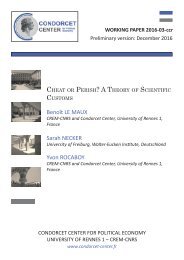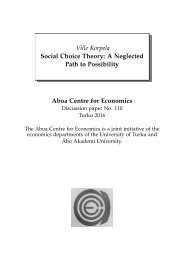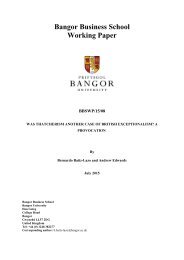MEMORANDUM
n?u=RePEc:hhs:osloec:2016_018&r=hpe
n?u=RePEc:hhs:osloec:2016_018&r=hpe
Create successful ePaper yourself
Turn your PDF publications into a flip-book with our unique Google optimized e-Paper software.
From the beginning of 1905 Wassily and Zlata could follow the news from Russia<br />
through the dramatic year which would go down in history as the 1905 Russian Revolution.<br />
It began with the Bloody Sunday, the massacre of hundreds of political demonstrators<br />
outside the Winter Palace in St. Petersburg. One of the demonstrators’ main demands was<br />
for a constituent assembly to be convened. For Wassily and Zlata it must have felt difficult<br />
to be away from Russia at such a fateful time. The politically engaged Wassily may have<br />
been exhilarated at the thought of a new reformed and democratic Russia breaking through.<br />
Zlata may not have been less interested in the political outcome but perhaps more<br />
concerned with the dangers the political turbulence and violence could mean for her family.<br />
But they did not have much choice; Zlata was pregnant. They made a hasty decision to go<br />
London to get married; the civil marriage ceremony took place on 17 March 1905.<br />
Afterwards the newlywed couple moved to Munich. Zlata Bekker enrolled at Munich<br />
University and intended to follow lectures for as long as Wassily had to remain in Munich<br />
for his degree. But Zlata Bekker had to suspend her study plans to prepare for childbirth. 12<br />
Wassily Leontief was born on 5 August 1905.<br />
1905 became a hectic year of political demands and struggle. The Tsar made attempts<br />
to saving his regime by offering reforms, e.g. the establishment of a parliament (Duma),<br />
but the Tsar retained absolute power. Thus a constituent assembly was never convened.<br />
The military remained loyal to the Tsar and made it possible quashing all opposition,<br />
executing thousands and imprisoning and exiling tens of thousands. A fascinating personal<br />
account of the 1905 events is given by in Wladimir Woytinsky. 13<br />
Several of Zlata’s family members in Odessa were involved in revolutionary activities<br />
in 1905; one brother was shot, other members of near family were arrested. In the<br />
aftermath of the 1905 political turmoil pogroms erupted in the western part of the Russian<br />
empire. In Odessa alone, eight hundred Jews were murdered, five thousand injured, and a<br />
hundred thousand left homeless. 14 Zlata’s parents and a younger sister, Liuba, fled Odessa<br />
in October 1905 and after a strenuous journey to Munich they moved in with the Leontief<br />
couple and their baby son until they could safely return to Russia.<br />
The doctoral dissertation of Leontief Sr. was on the cotton industry in St.Petersburg<br />
and its workers: Die Baumwollindustrie in Petersburg und ihre Arbeiter. 15 A part of the<br />
dissertation is built on statistics of a cotton-printing factory with about 500 workers which<br />
12 Alpers (2013, p.23). Zlata Bekker eventually completed a degree at Petrograd University in 1923.<br />
13 Woytinsky (1961, pp.3-145). Woytinsky who was five years younger than Leontief Sr. took<br />
active part in the political activity in 1905, after which he endured four years imprisonment<br />
followed by exile in Irkutsk until 1917.<br />
14 Clark (2016, p.58), Alpers (2013, pp.36-42).<br />
15 See Alpers (2013, pp.13-19). Munich University liberally accepted Wassily Wassilievich despite<br />
having no university exam; the Leipzig Handelshochschule did not have university status, cf.<br />
Wittich (2016).<br />
9





